Topic 1
All about mental health
In this section, we’ll dive into learning about mental health, the role of the brain, how our mental health can change and the importance of using the right language.
Want to listen to this information? Play the audio track and follow along through the section as you listen!
(Narrator) Mental health is all about how you think, feel and act in response to life’s daily challenges. Your mental health can affect how you respond to these challenges and vice versa.
Your mental health is just like your physical health. It is something you need to take care of every day. This means checking in with yourself and taking care of your mind. It’s like taking care of your body by eating breakfast or getting exercise.
Having good mental health doesn’t mean you always feel positive. It’s normal to feel emotions like stress, sadness, anger or frustration when facing challenges.
Stress is something that can happen to anyone. Knowing when you’re feeling stressed and finding ways to overcome it is an important part of taking care of your mental health.
Mental health is much more talked about today than it was when your parents and grandparents were young. That said, it is important to use the right language when talking about mental health.
Using the right language helps reduce inaccurate or harmful stereotypes and beliefs about mental health known as stigma. It can also help you and others understand the different yet connected states of mental health, which include mental distress, mental health challenges and mental health conditions.
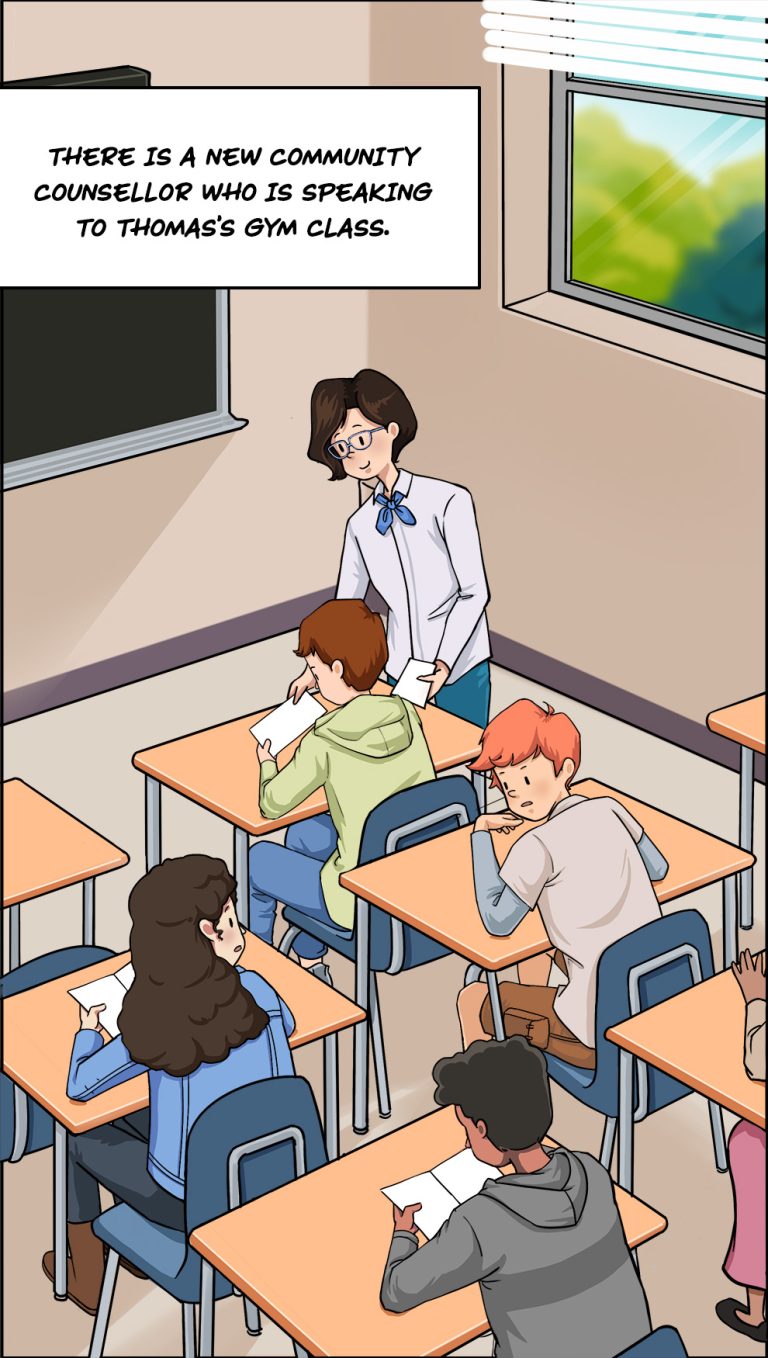
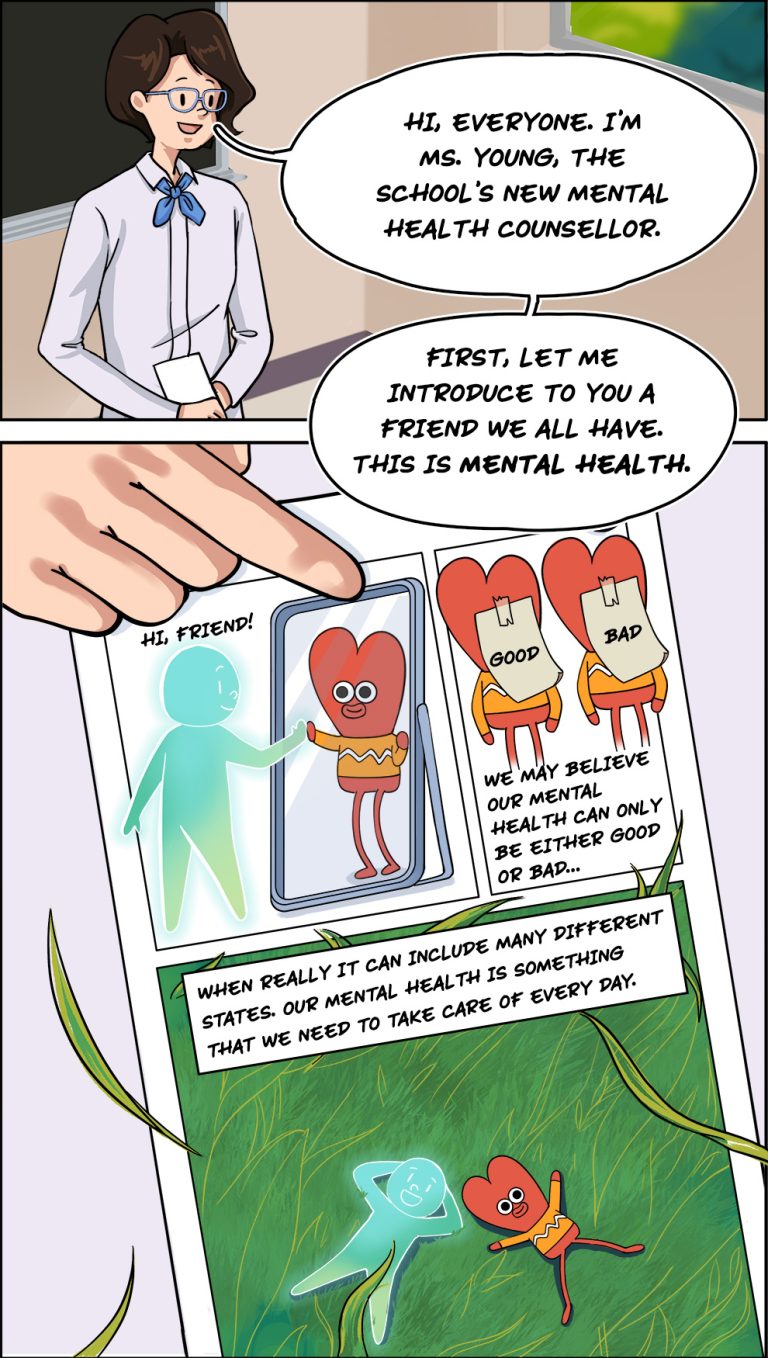
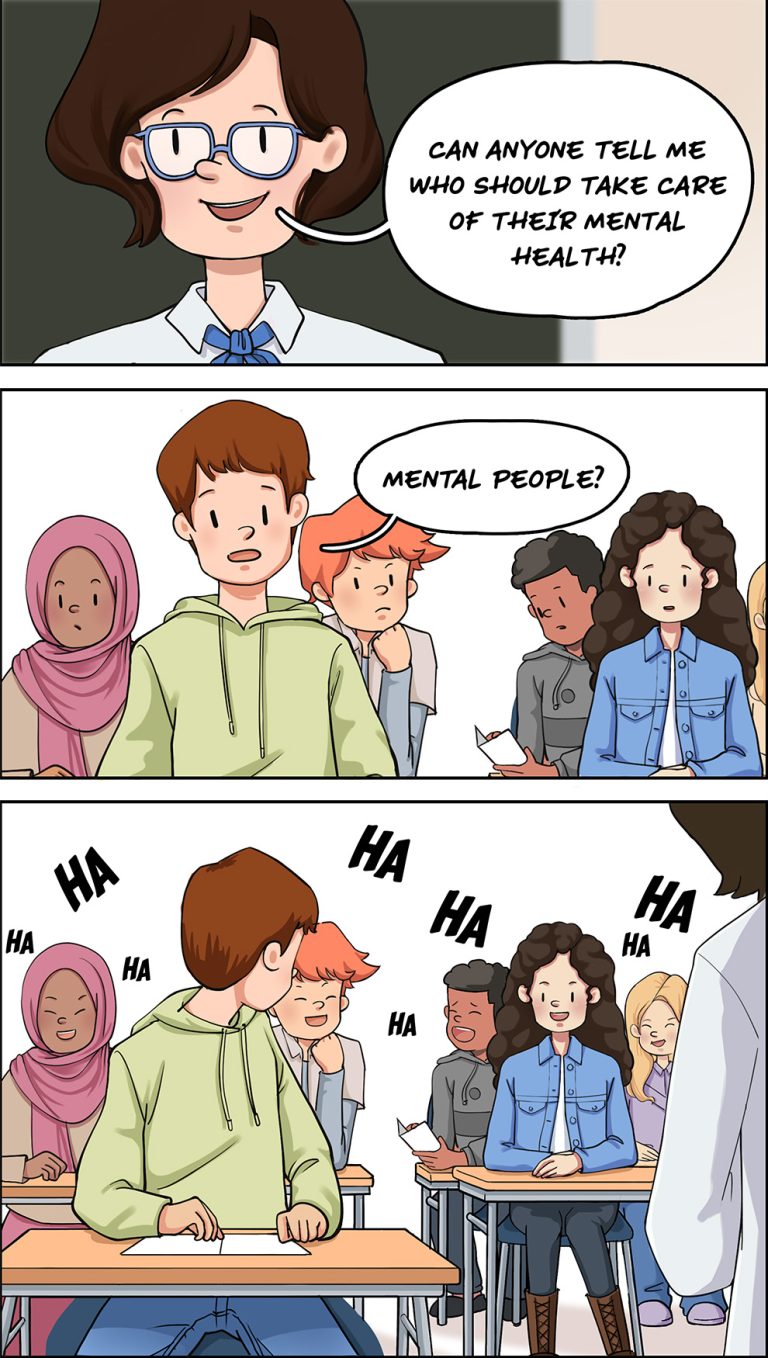
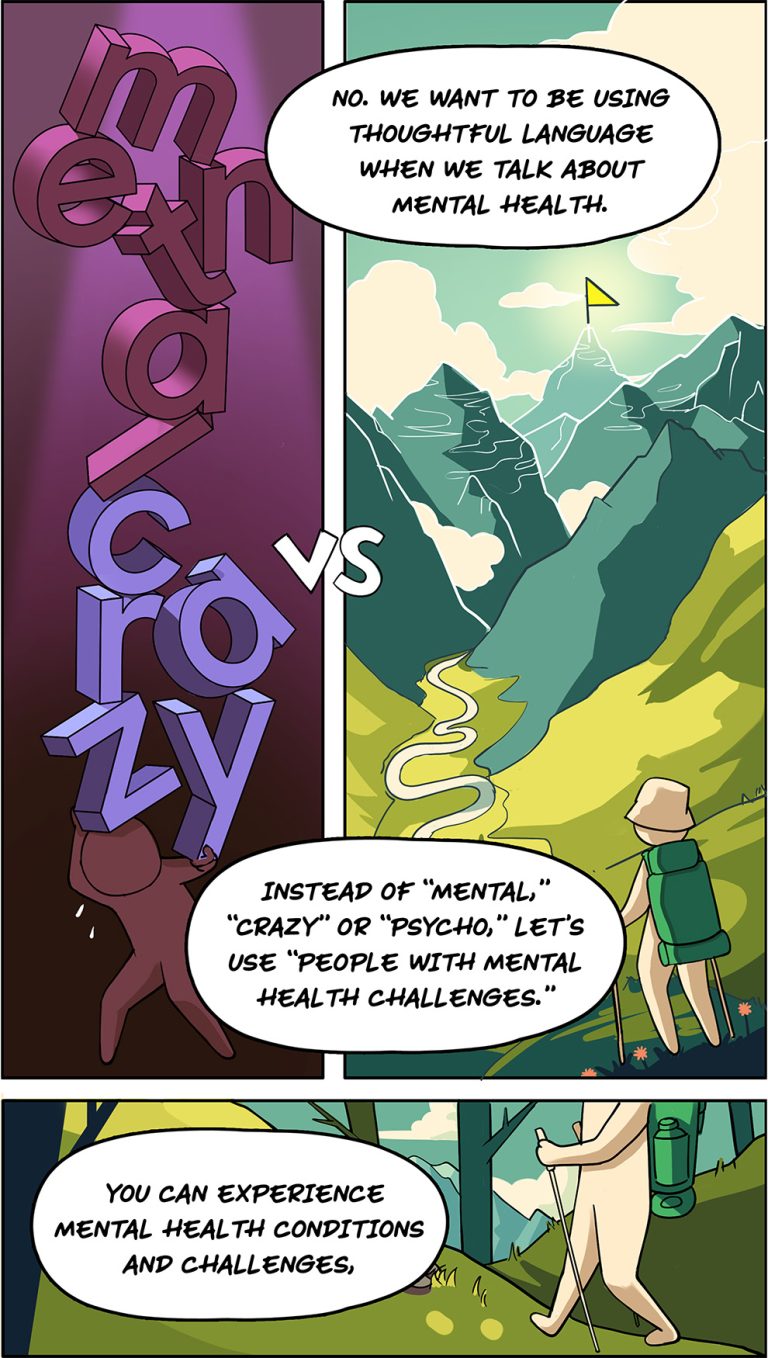
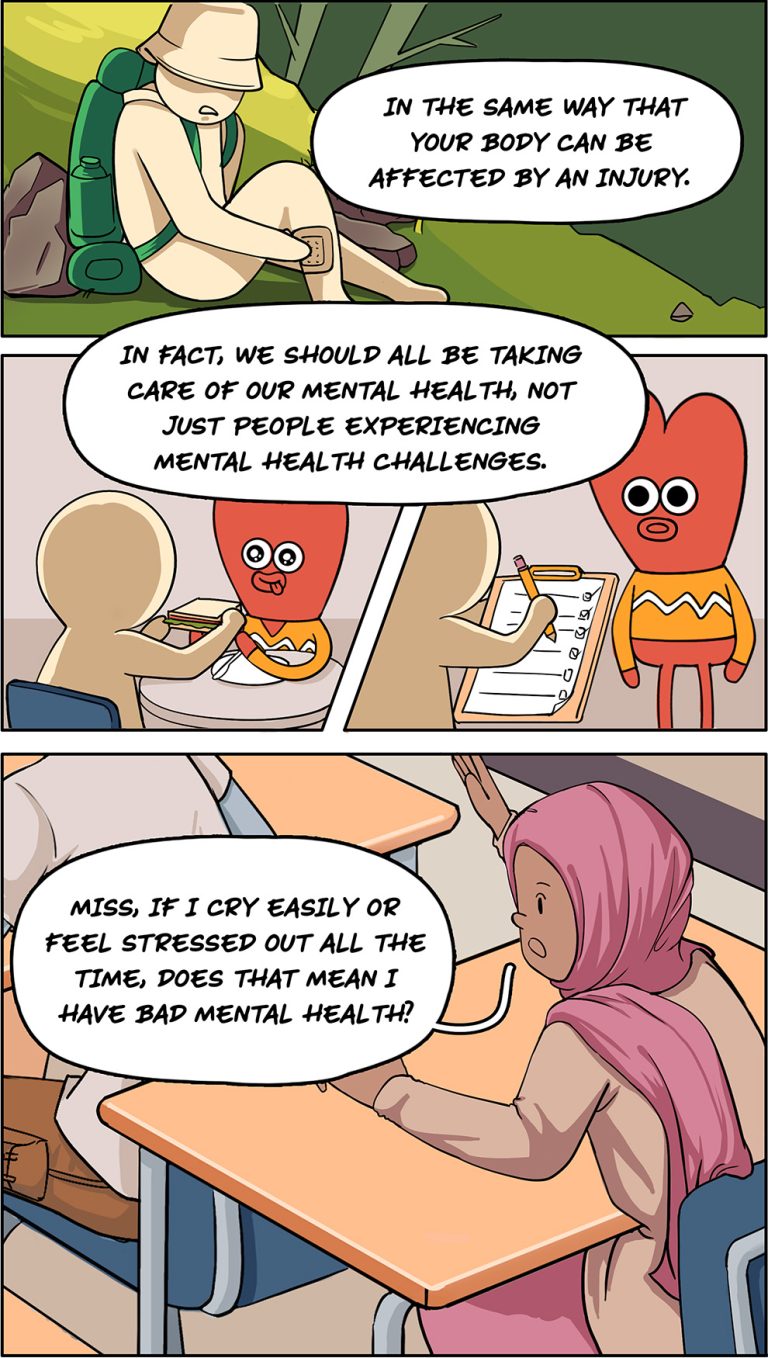
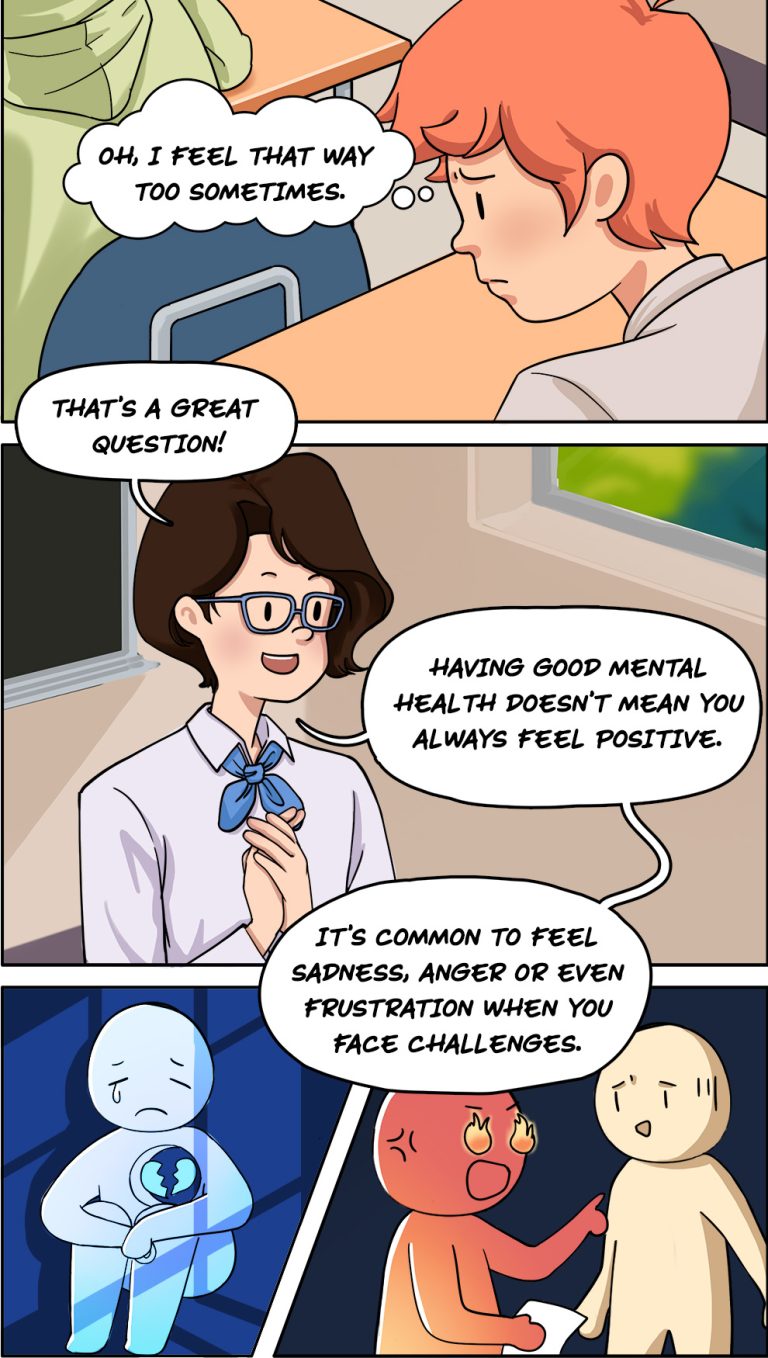
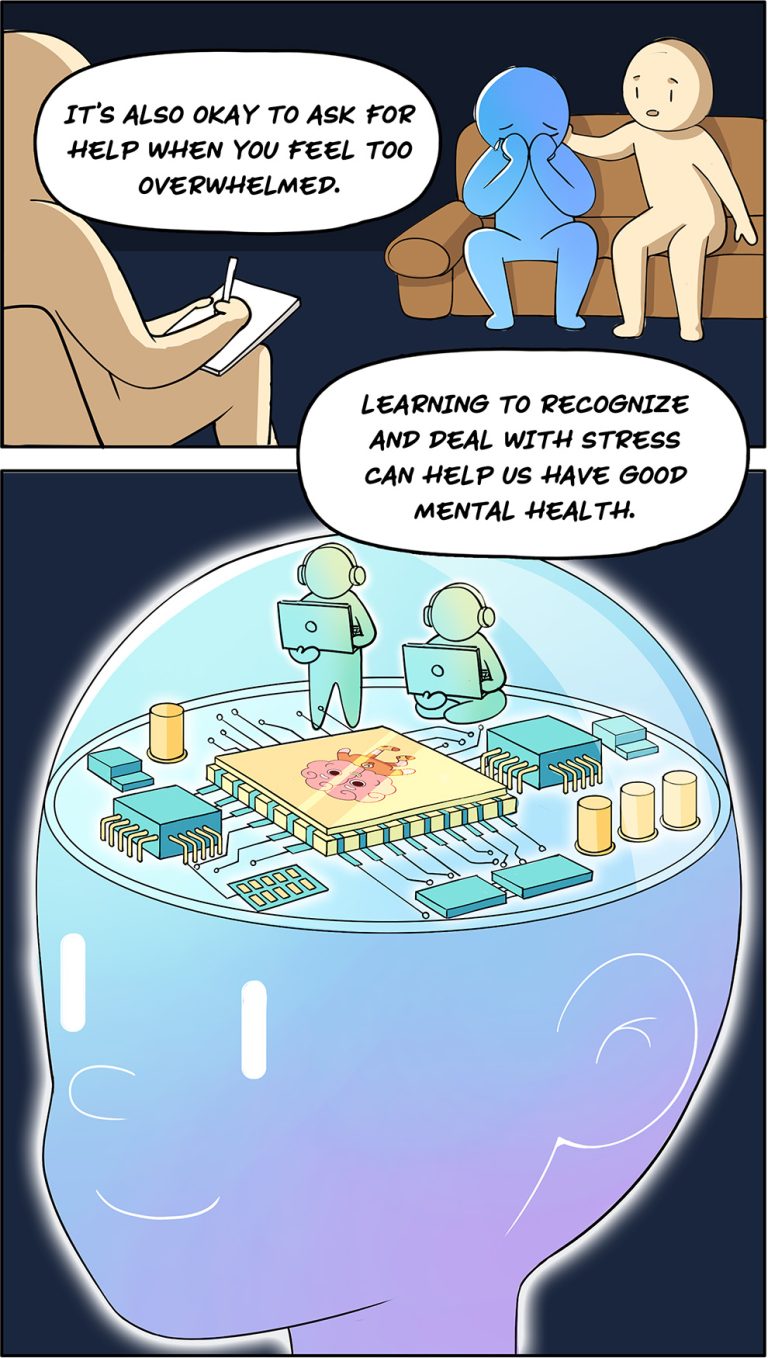
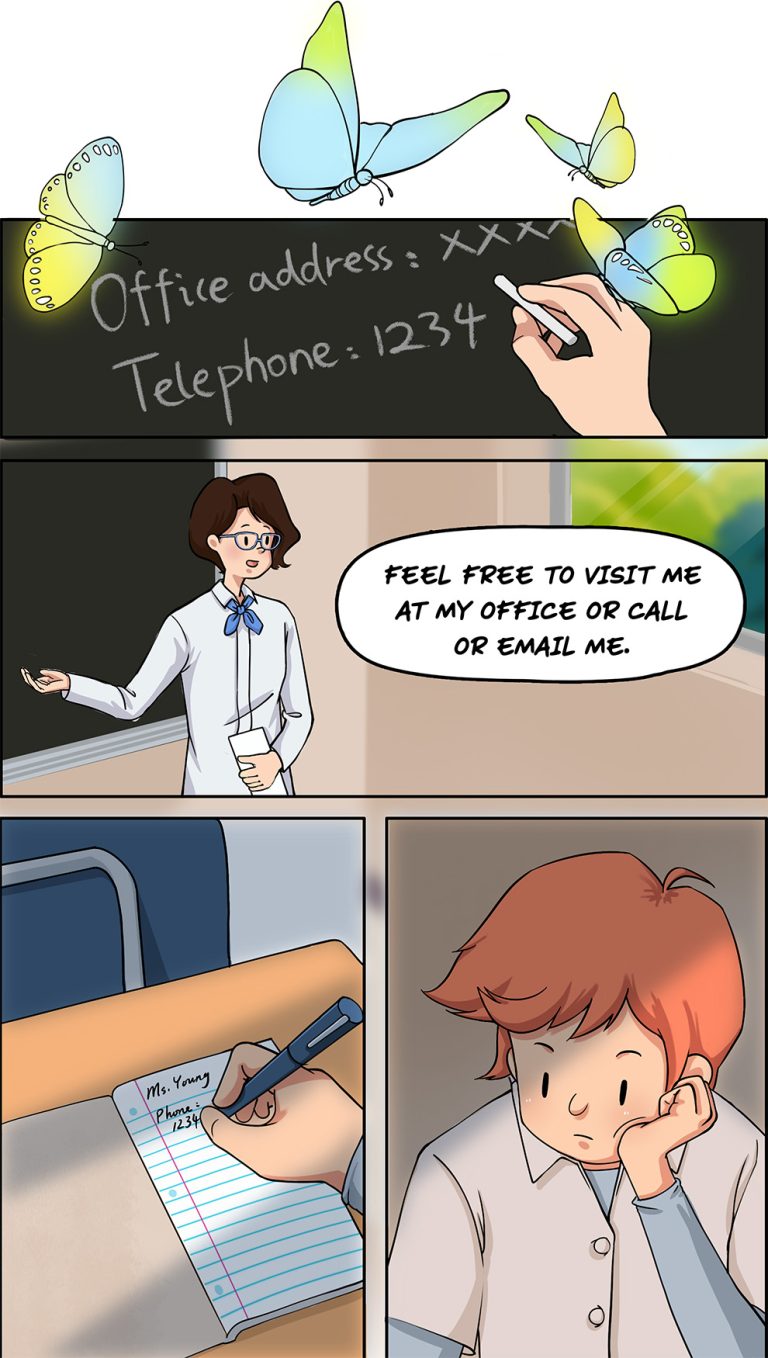
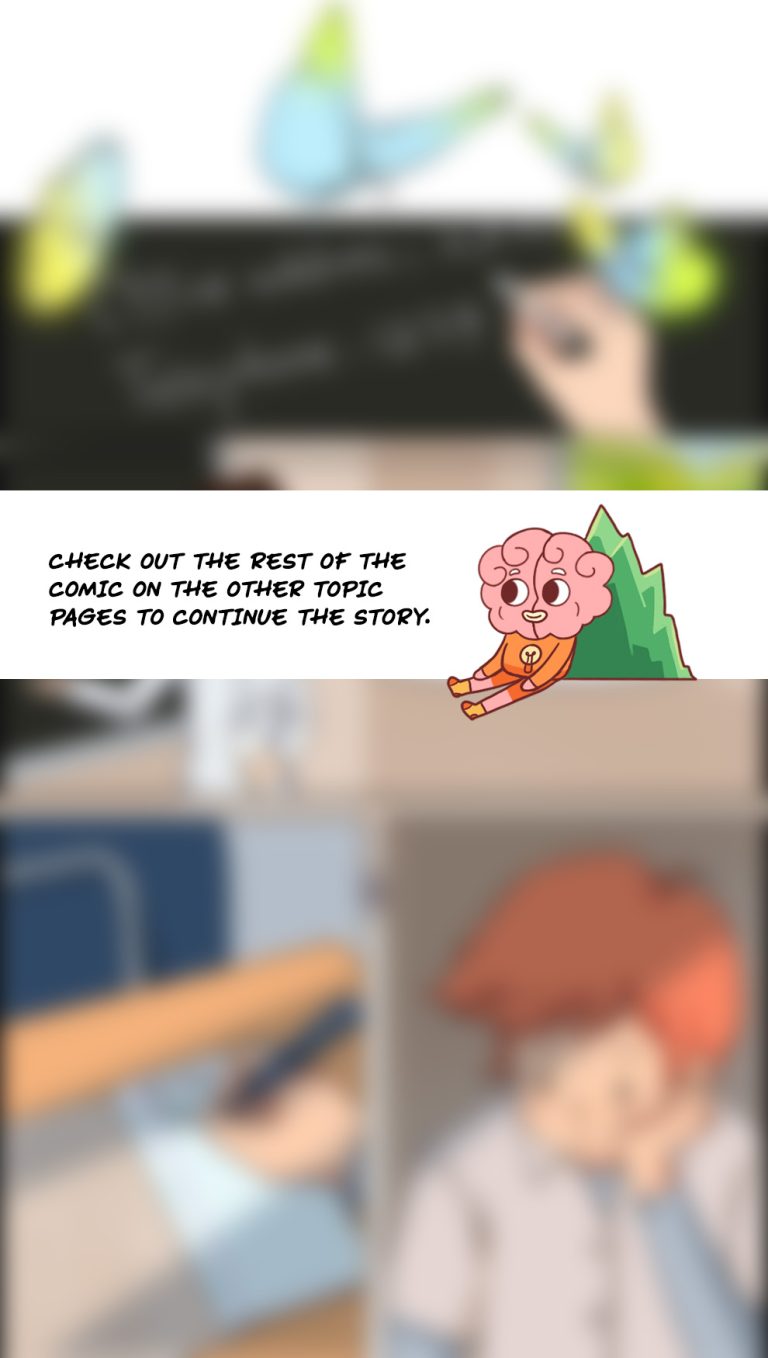
[There is a new community counsellor, Ms. Young, who is speaking to Thomas’s gym class. She is passing around some pamphlets to the class.]
(Ms. Young) Hi, everyone. I’m Ms. Young, the school’s new mental health counsellor. First, let me introduce to you a friend we all have. This is Mental Health.
[The pamphlet reads, “Hi, friend! We may believe our mental health can only be either good or bad, when really it can include many different states. Our mental health is something that we need to take care of every day.”]
(Ms. Young) Can anyone tell me who should take care of their mental health?
(Student A) Mental people?
[Some students laugh in the back.]
(Ms. Young) No. We want to be using thoughtful language when we talk about mental health. Instead of “mental,” “crazy” or “psycho,” let’s use “people with mental health challenges.” You can experience mental health conditions and challenges, in the same way that your body can be affected by an injury. In fact, we should all be taking care of our mental health, not just people experiencing mental health challenges.
(Student B) Miss, if I cry easily or feel stressed out all the time, does that mean I have bad mental health?
[Thomas’s thoughts] Oh, I feel that way too sometimes.
(Ms. Young) That’s a great question! Having good mental health doesn’t mean you always feel positive. It’s common to feel sadness, anger or even frustration when you face challenges. It’s also okay to ask for help when you feel too overwhelmed. Learning to recognize and deal with stress can help us have good mental health.
[Some time passes and Ms. Young points to the contact info she wrote on the chalkboard: “Office address: XXX, Telephone: 1234”]
(Ms. Young): Feel free to visit me at my office or call or email me.
[Thomas looks at the contact information he just wrote down and the pamphlet he received. He is deep in thought.]
CHECK OUT THE REST OF THE COMIC ON THE OTHER TOPIC PAGES TO CONTINUE THE STORY.
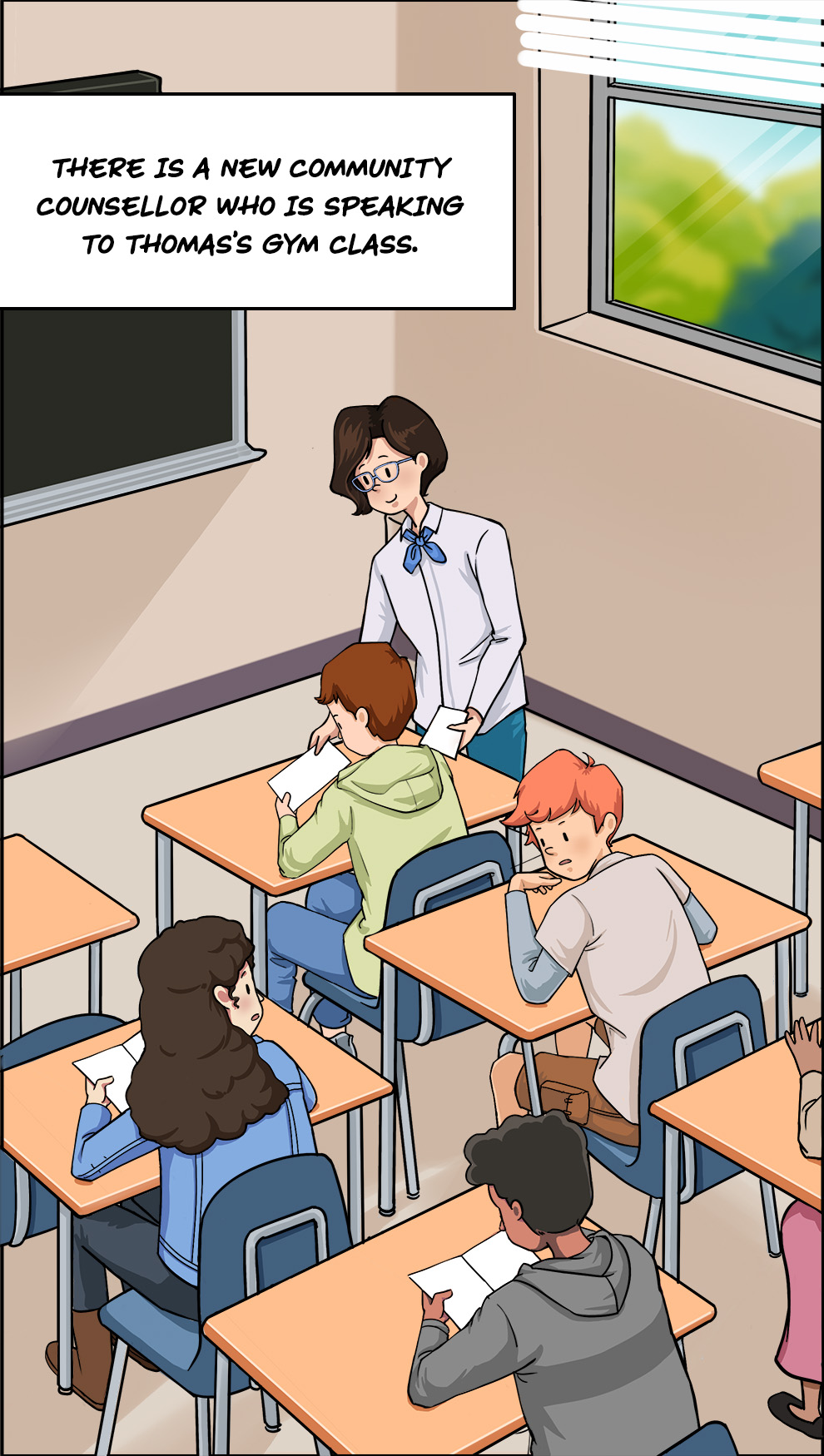
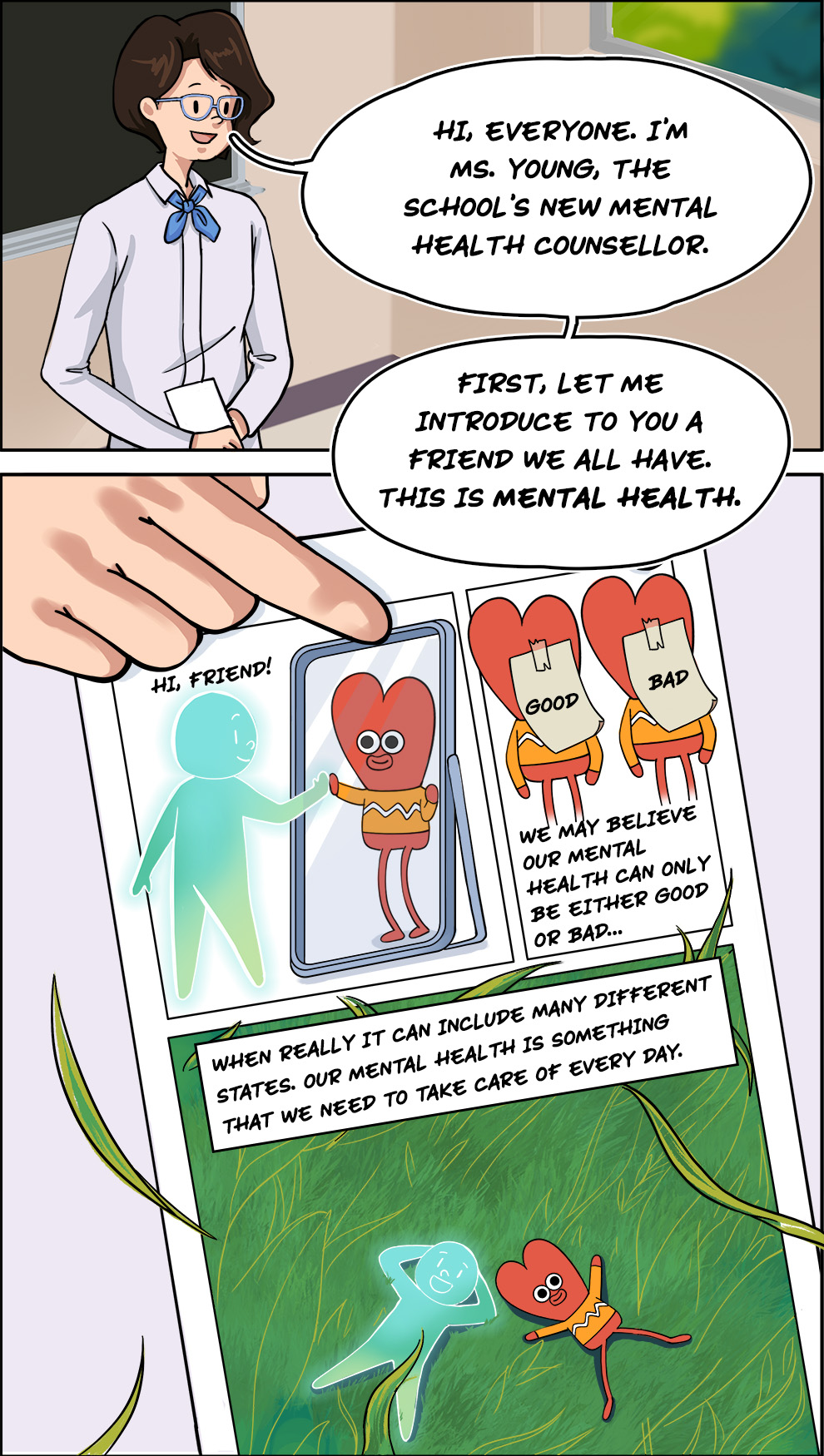
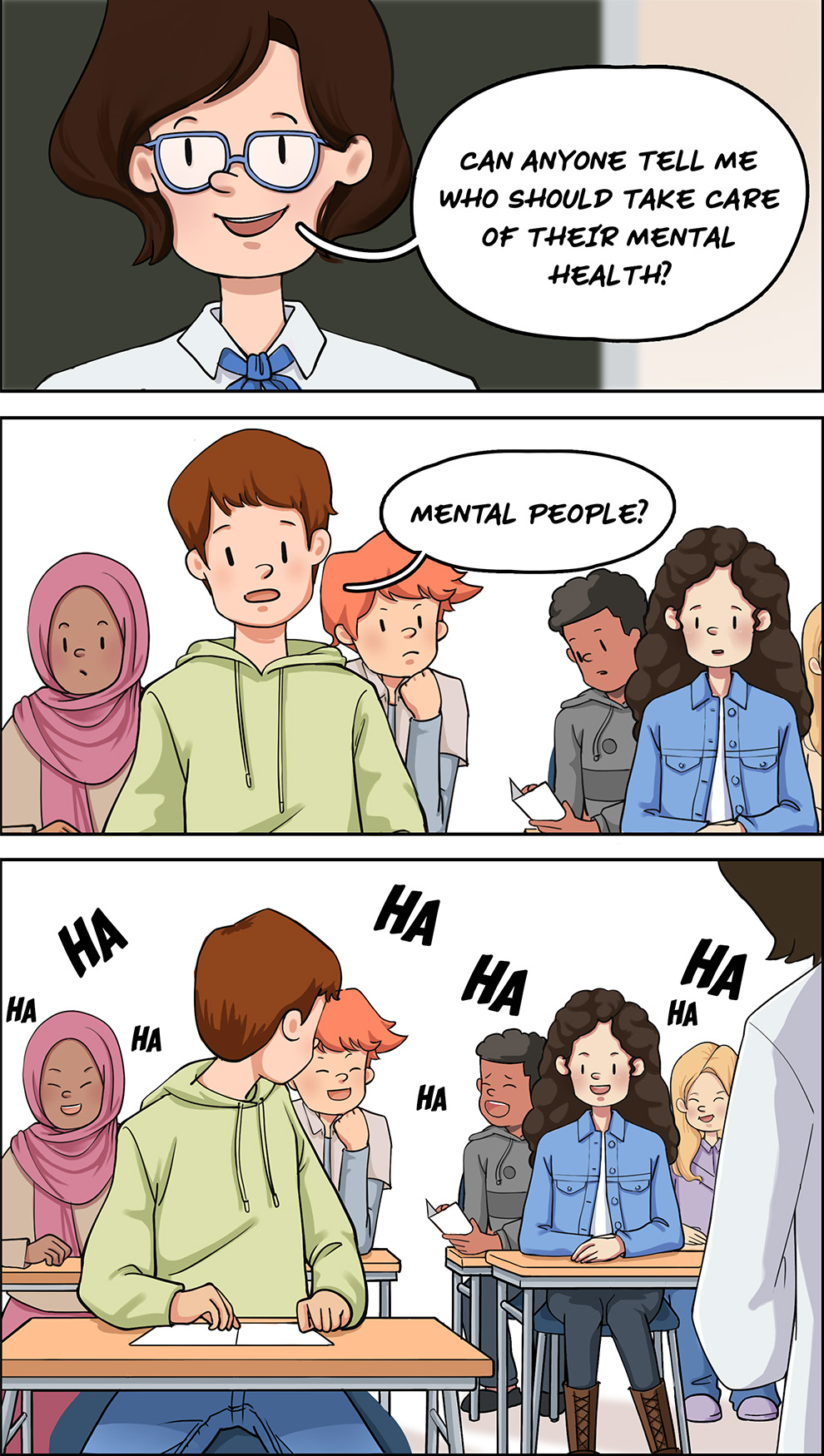
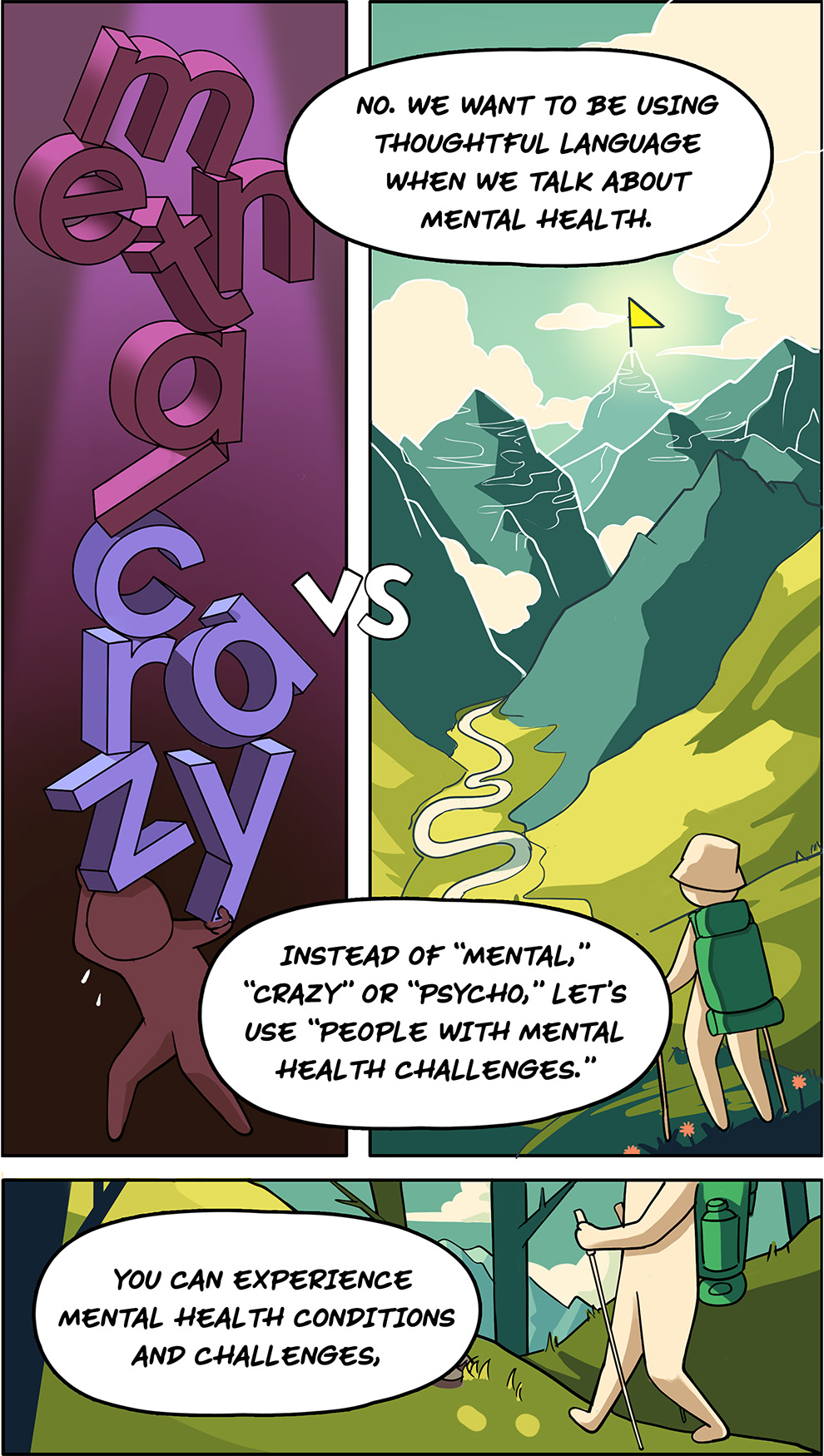
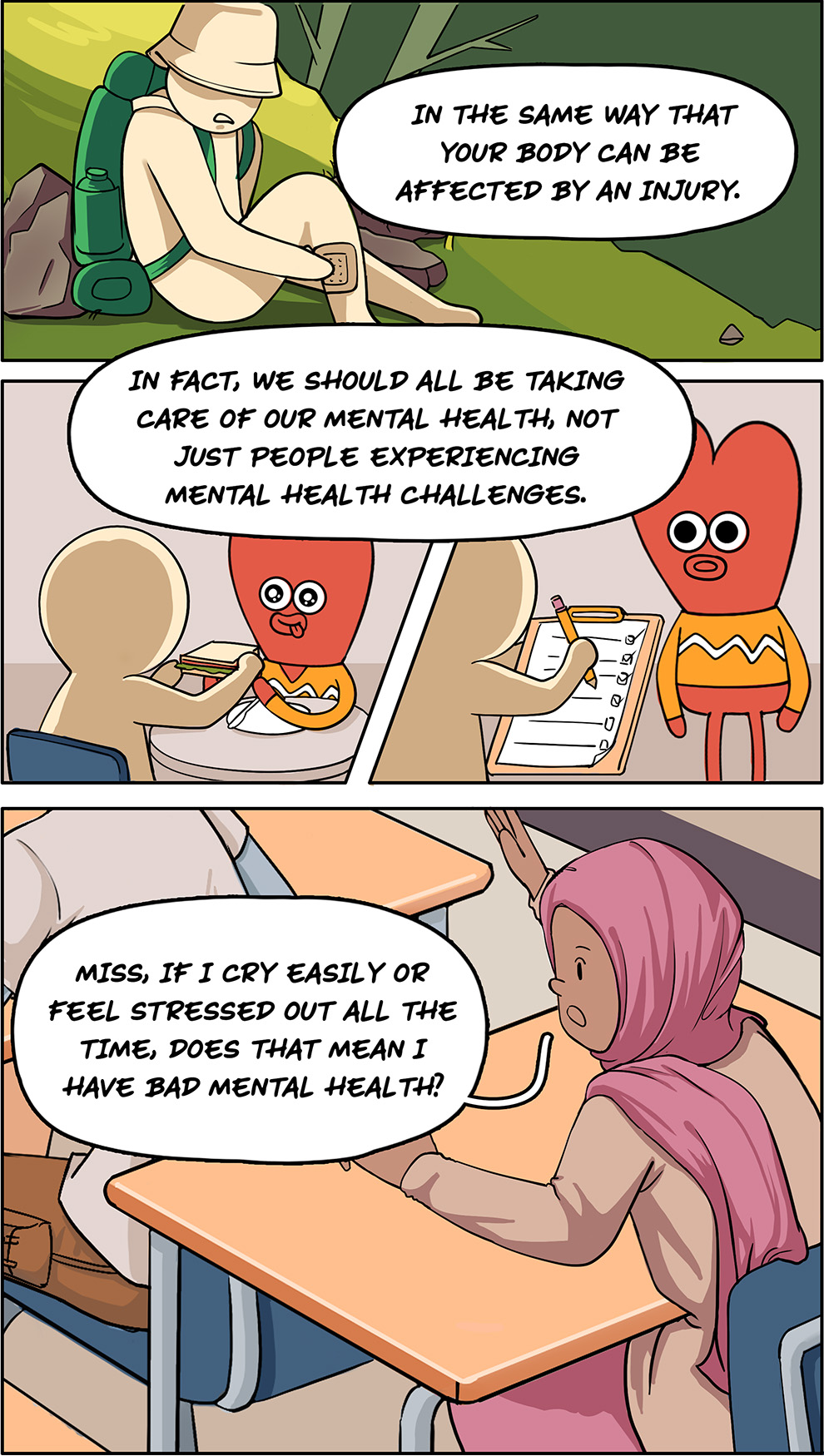
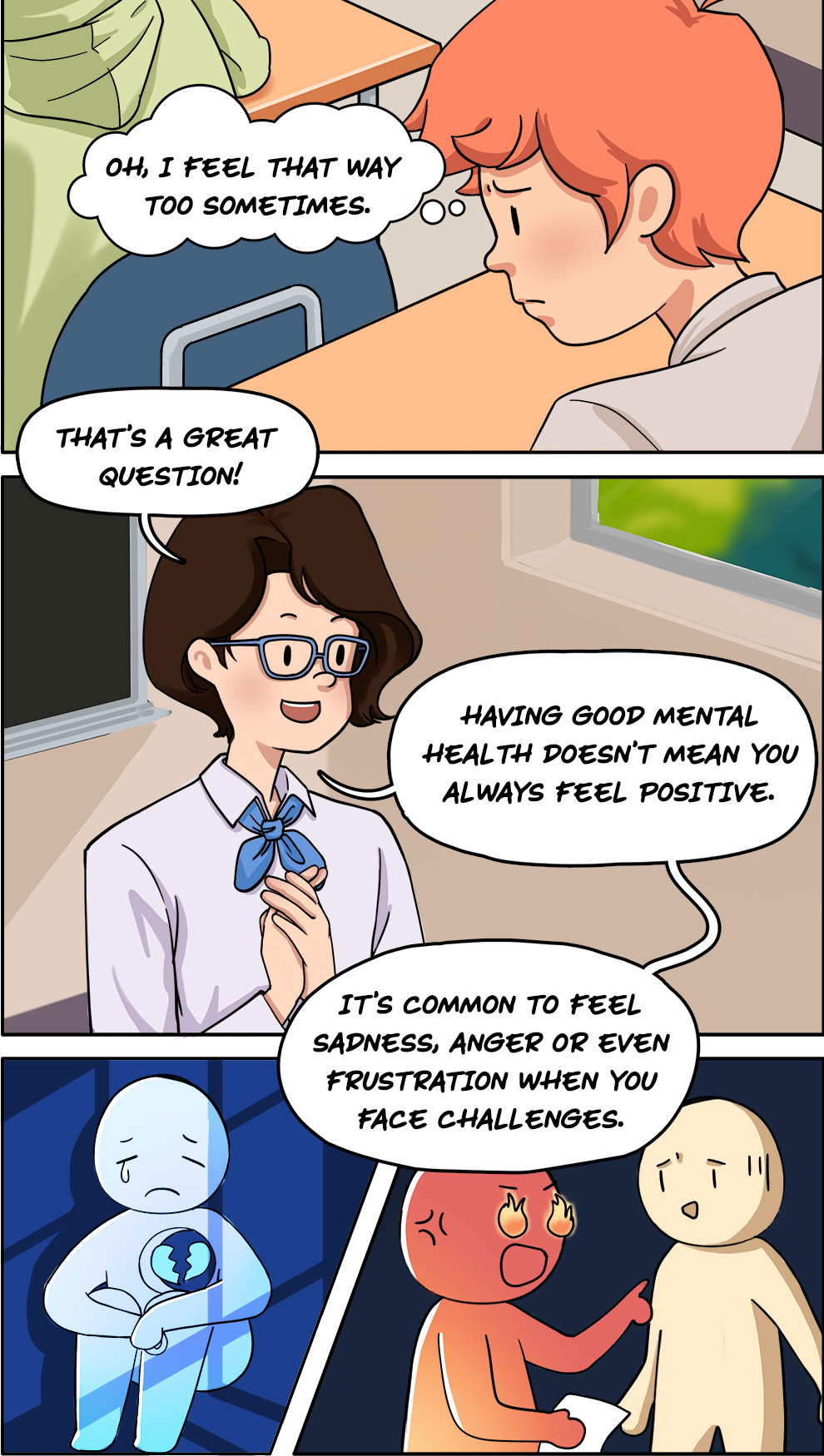
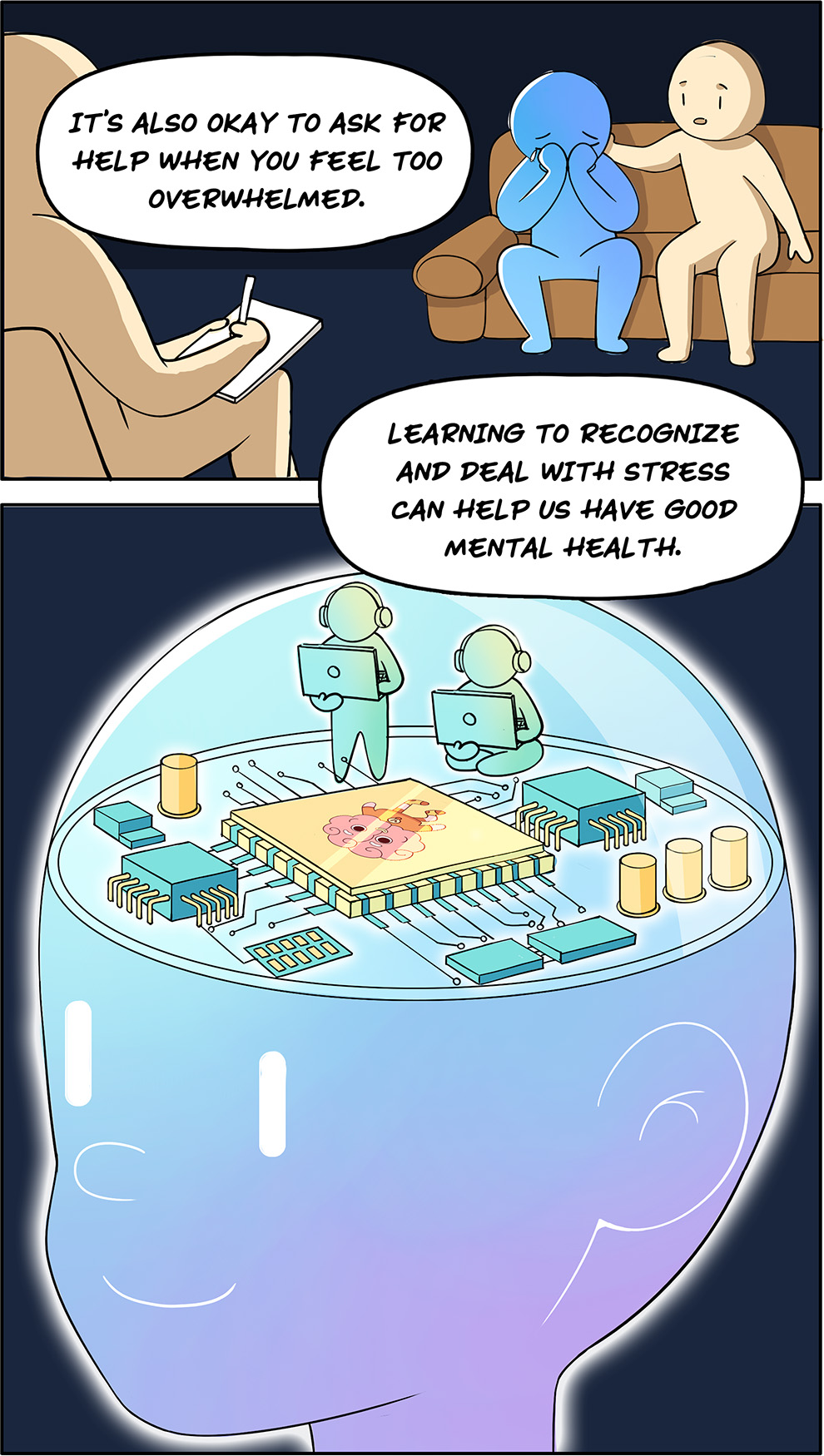
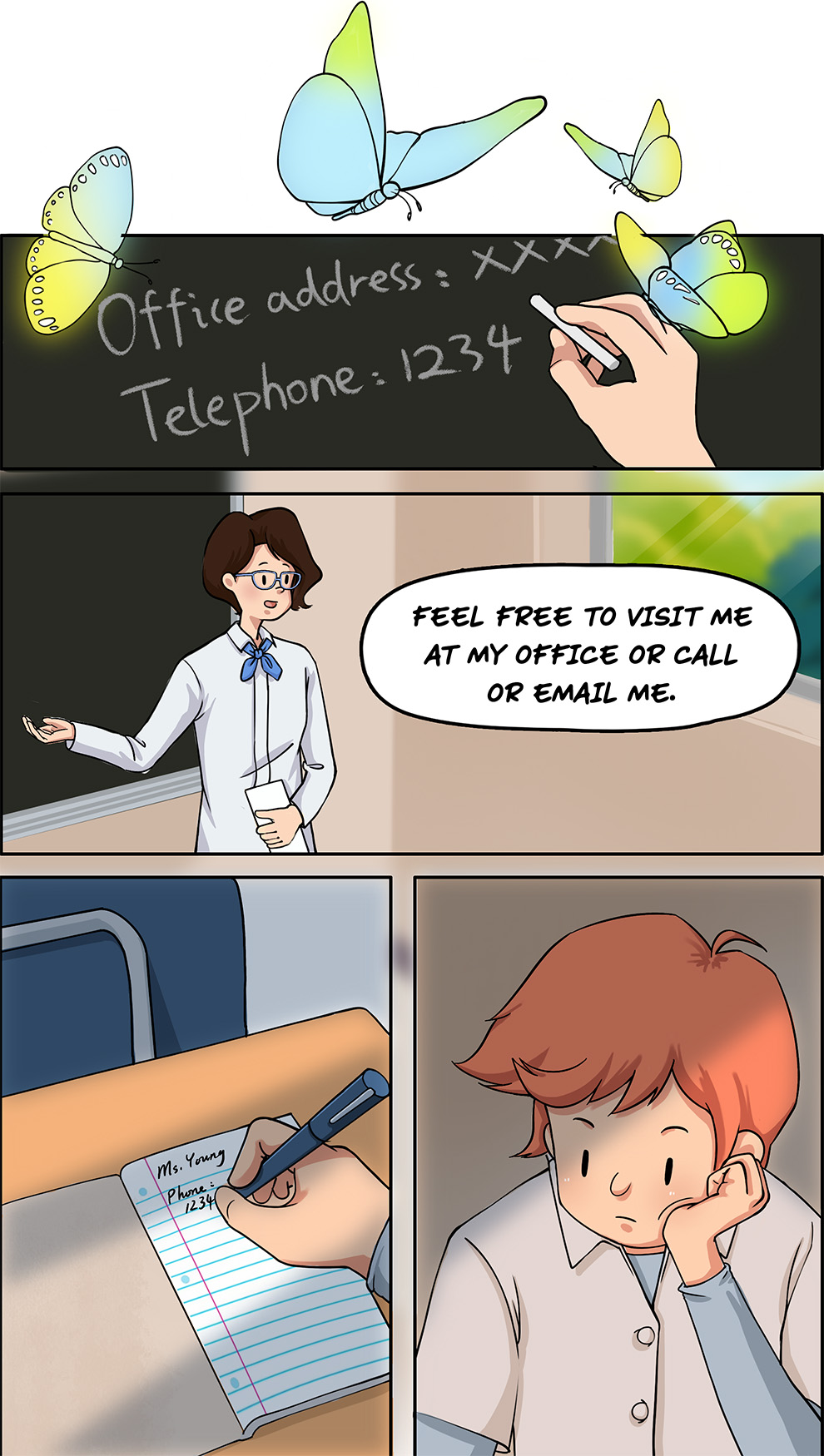
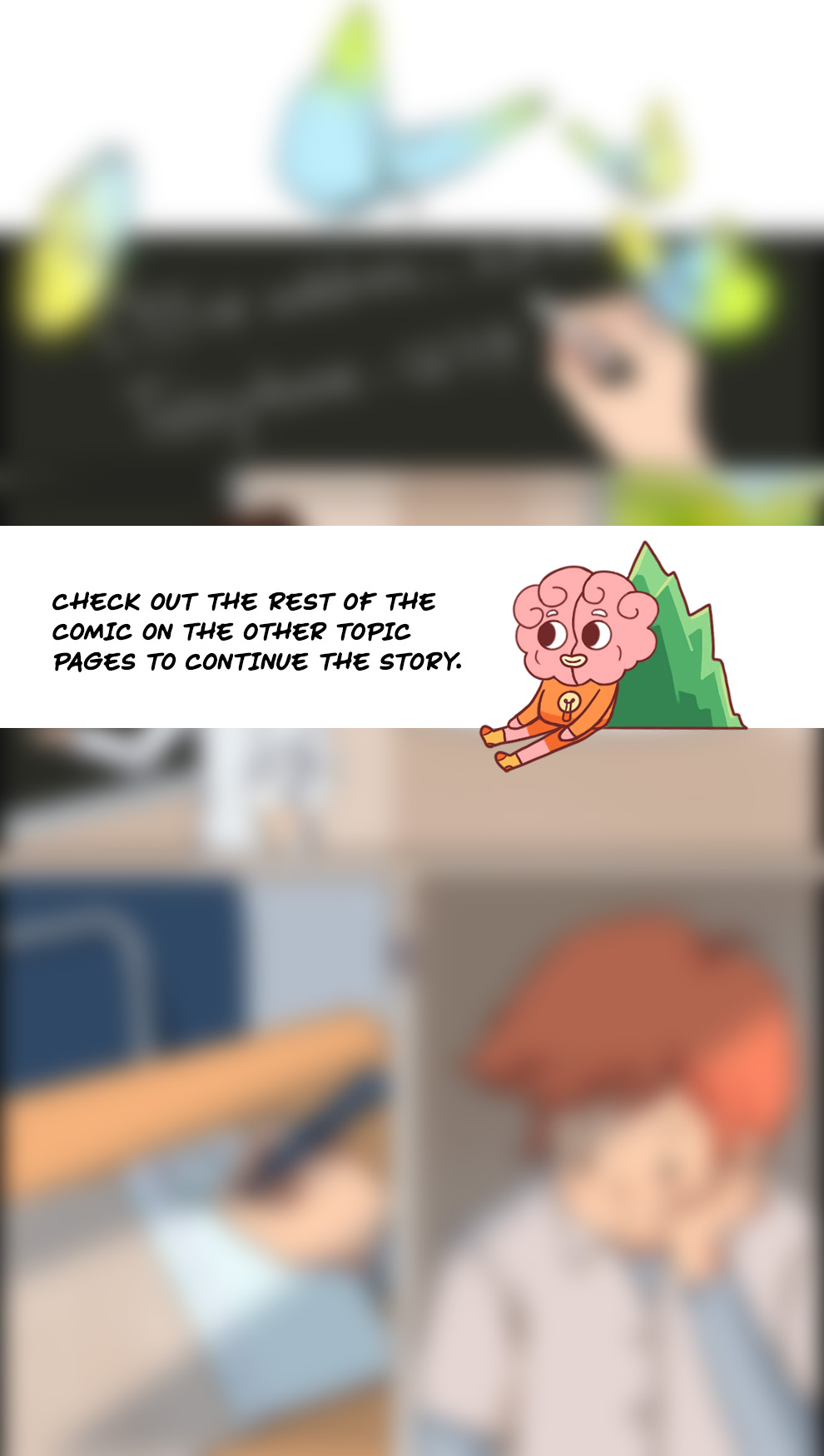
[There is a new community counsellor, Ms. Young, who is speaking to Thomas’s gym class. She is passing around some pamphlets to the class.]
(Ms. Young): Hi, everyone. I’m Ms. Young, the school’s new mental health counsellor. First, let me introduce to you a friend we all have. This is Mental Health.
[The pamphlet reads, “Hi, friend! We may believe our mental health can only be either good or bad, when really it can include many different states. Our mental health is something that we need to take care of every day.”]
(Ms. Young): Can anyone tell me who should take care of their mental health?
(Student A): Mental people?
[Some students laugh in the back.]
(Ms. Young): No. We want to be using thoughtful language when we talk about mental health. Instead of “mental,” “crazy” or “psycho,” let’s use “people with mental health challenges.” You can experience mental health conditions and challenges, in the same way that your body can be affected by an injury. In fact, we should all be taking care of our mental health, not just people experiencing mental health challenges.
(Student B): Miss, if I cry easily or feel stressed out all the time, does that mean I have bad mental health?
[Thomas thinks, “Oh, I feel that way too sometimes”.]
(Ms. Young): That’s a great question! Having good mental health doesn’t mean you always feel positive. It’s common to feel sadness, anger or even frustration when you face challenges. It’s also okay to ask for help when you feel too overwhelmed. Learning to recognize and deal with stress can help us have good mental health.
[Some time passes and Ms. Young points to the contact info she wrote on the chalkboard: “Office address: XXX, Telephone: 1234”.]
(Ms. Young): Feel free to visit me at my office or call or email me.
[Thomas looks at the contact information he just wrote down and the pamphlet he received. He is deep in thought.]
CHECK OUT THE REST OF THE COMIC ON THE OTHER TOPIC PAGES TO CONTINUE THE STORY.
Your mental health matters
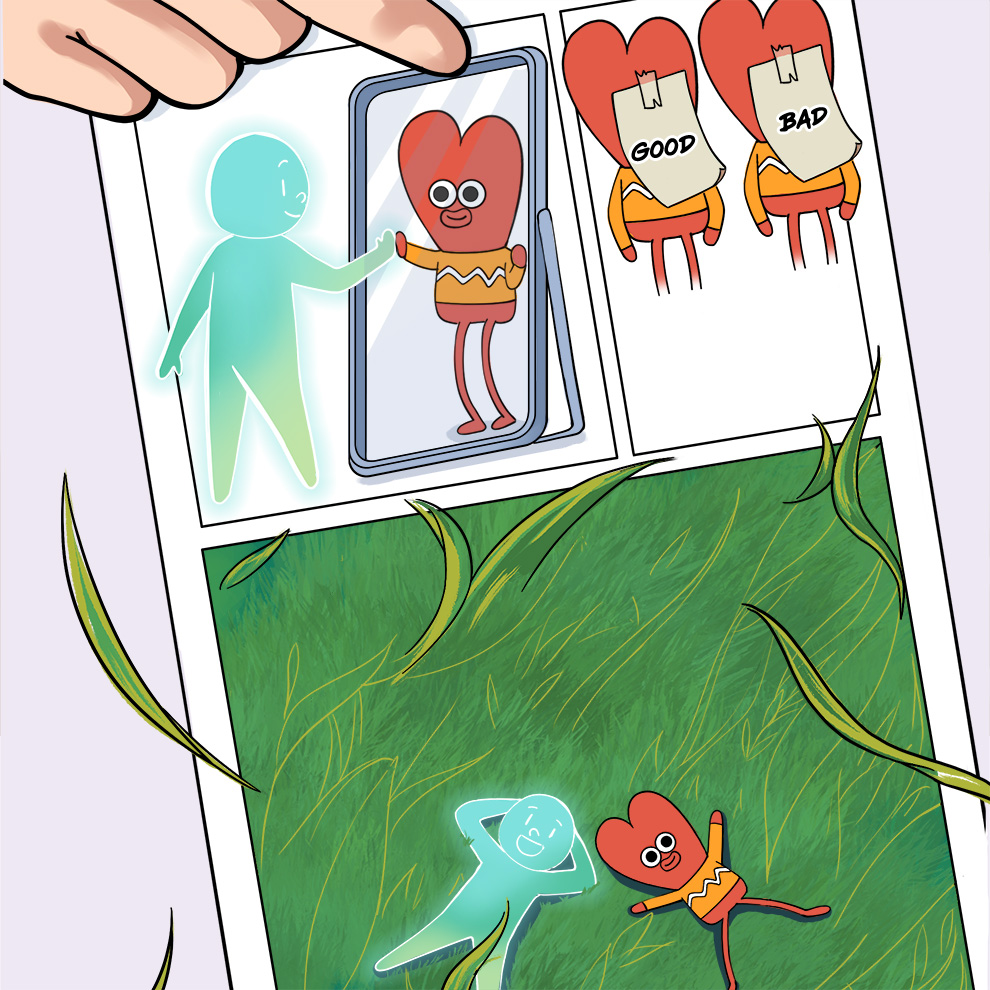
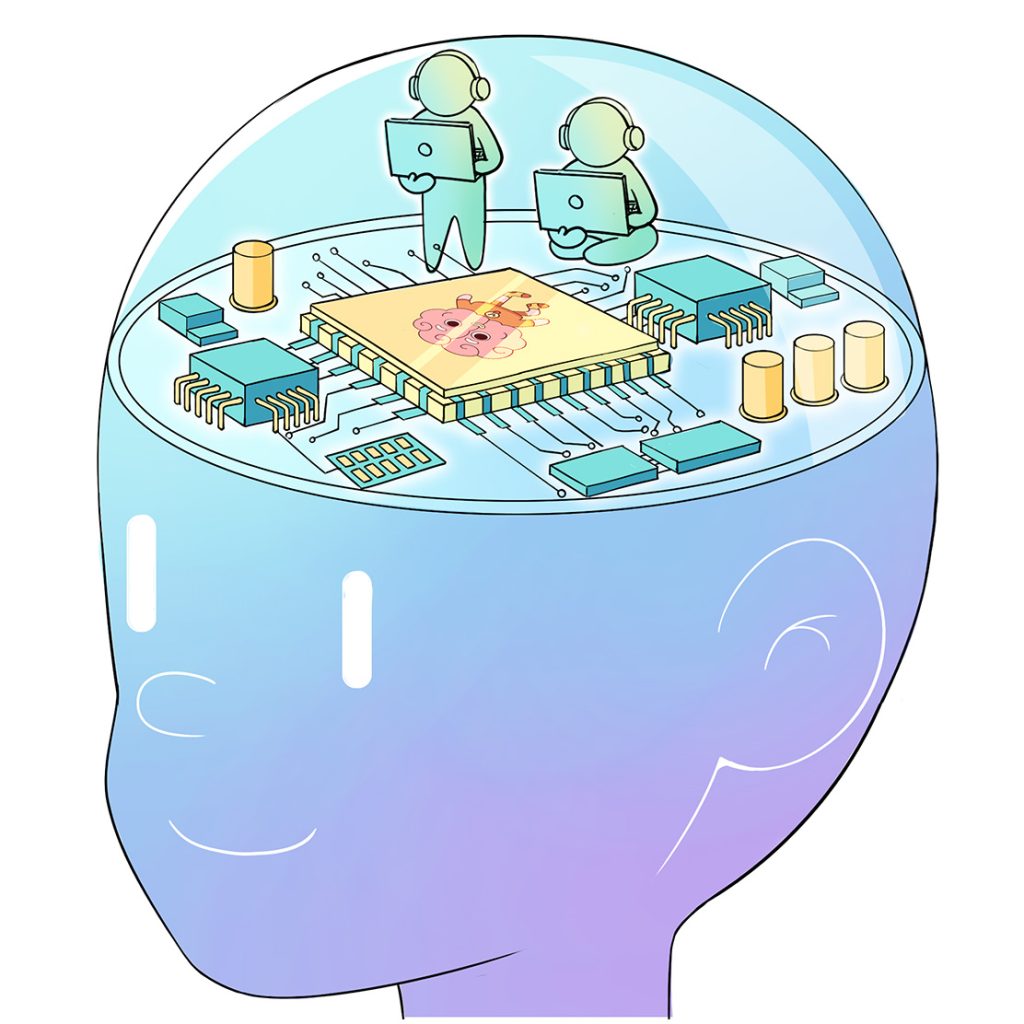
The brain is like a control centre
(Narrator) Your brain is an important part of your body and mental health. It is the control centre in charge of everything to do with you and your body, from your thoughts and feelings, to your senses and movements, to how you react and even what you remember.
In other words, everything you do, think, feel or experience is connected to your brain. You can think of the brain as a team made up of different parts or “team members” working together to complete a common goal.
These team members form a network that sends messages called “signals” to the different areas of the body. These signals can make you wave to your friend and hear them say “hello,” or even allow you to remember your friend’s name.
Your mental health is related to six key functions of your brain:
- The first is thinking, which happens when your brain processes information so you can understand things.
- Another brain function is perception. This is what happens when you smell, taste, see, feel and hear the world around you.
- Related to perception is emotions — your brain can help you feel emotions such as happiness or sadness.
- Your brain also communicates with different parts of your body by sending signals.
- As well, your brain helps you with basic physical movements and actions, such as breathing or walking.
- Last but not least, your brain helps you make decisions about how to act and behave.
Your brain is in charge of your thoughts and feelings, your senses and movements, your reactions to the world around you, and even your memories.
In other words, everything you do, think, feel or experience is connected to your brain.
A team with a common goal
Your brain controls six key functions:

Thinking
Thinking

Perception
Perception

Emotion
Emotion

Signals
Signals

Physical
Physical

Behaviour
Behaviour
As you grow, your brain is still learning and changing
Make friends
Take risks
Try new things
As you grow, your brain is still learning and changing
Make friends
Take risks
Try new things
Mental health is a spectrum
- No mental distress, mental health challenges or conditions
- Mental distress
- Mental health challenge
- Mental health conditions
These states are different but connected. People can experience one or more states at the same time. For example, a person can experience good mental health and have a diagnosed mental health condition too.
Even though all of the mental states are connected, each of them need their own type of treatment and care. For example, a person dealing with a mental health challenge might need different support than someone with a mental health condition, just like someone with a sprained ankle may need different care than someone with a broken ankle.
Let’s learn more about these different states
1
No mental distress, mental health challenges or conditions
- You may be feeling calm, happy or excited.
- When you’re in this state, you may be having fun with friends or doing something you enjoy, like sports or art.
2
Mental distress
- Mental distress often comes from everyday events. Have you ever felt anxious when writing a test or frustrated after a fight with your friend?
- In this state, your brain sends a signal of anxiety or stress when something in your environment is challenging or demanding.
- This signal, called a stress signal or stress response, is made up of different parts:
- Emotions and feelings: Feeling nervous, worried or scared
- Thoughts: Telling yourself that you are going to fail your test
- Physical symptoms: Sweating, feeling sick, headaches
- Behaviours: Having angry outbursts, overeating or undereating
3
Mental health challenges
- You might face bigger challenges or stressors that can create a mental health challenge.
- Some examples of these challenges are:
- The death of a friend or Family member
- Being bullied at school
- Dealing with a serious illness
- Mental health challenges are part of life. They are not the same as a mental health condition.
- When you’re going through a mental health challenge, you might have trouble with things you typically do well, like school, art or sports. It’s important to know that there are things you can do to feel better, such as learning how to manage stress or talking to a trusted adult.
4
Mental health conditions
- A mental health condition is different from mental distress and mental health challenges.
- A mental health condition is a medical condition that affects how a person thinks, feels and behaves. In some cases, it can mess up routines and activities, like showering or going to school.
- You can think of mental health conditions in the same way as a physical health condition. Both can be mild or severe and can make it harder to function like usual.
- A physical health condition happens because of changes in the body, like a broken bone.
- A mental health condition (like depression or anxiety) happens because of changes in the brain.
- Mental health conditions need to be diagnosed by a doctor. You need to show specific signs and symptoms for a diagnosis to be made.
You can think of the mental health states as a pyramid
(Click/tap on each level of the pyramid to find out more)
Adapted from MentalHealthLiteracy.org
Bottom of the pyramid
No mental distress, mental health challenges or conditions
If you’re at the bottom of the pyramid, you’re not experiencing any mental distress, mental health challenges or mental health conditions. You may or may not use strategies to look after your mental health at this level.
Second level of the pyramid
Mental distress
The next level of the pyramid is mental distress. You might not need any support if you experience mental distress once in a while. You may overcome distress by using specific coping tools or strategies, or with the support of your Family, friends, teachers or community.
Third level of the pyramid
Mental health challenges
At the third level is mental health challenges. If you are dealing with mental health challenges, you may need extra help, such as counselling, along with Family and community support.
Top of the pyramid
Mental health conditions
Being at the top of the pyramid means that you have a mental health condition. If you’re in this state, you may need help from trained professionals and specific treatments, like medication or other types of care. Your treatment and care may be more take more time and focus than at the other levels.
You may be feeling calm, happy or excited at this level.
You may be feeling annoyed, sad or worried at this level.
You may be experiencing heartbreak, grief or worry at this level.
You may be diagnosed with a mental health condition like depression, an eating disorder or schizophrenia at this level.

Being at the bottom does not mean you’ll end up at the top
Being at the lower levels of the pyramid does not necessarily mean that you’ll end up in a mental health state higher up on the pyramid. In other words, being in mental distress doesn’t always lead to a mental health challenge or condition. As well, you may even experience some or all of these states at the same time or at various times throughout your life.
All levels of the pyramid are part of our mental health
All levels of the pyramid are part of your overall mental health. It’s important to make sure that you don’t think of good mental health as always being in a good mood or never feeling unhelpful or negative emotions.
Good mental health includes many different types of emotional states.
If a person has a mental health condition, it does not mean that they have bad mental health. They can still experience good mental health, just as someone who doesn’t have a mental health condition can experience poor mental health.

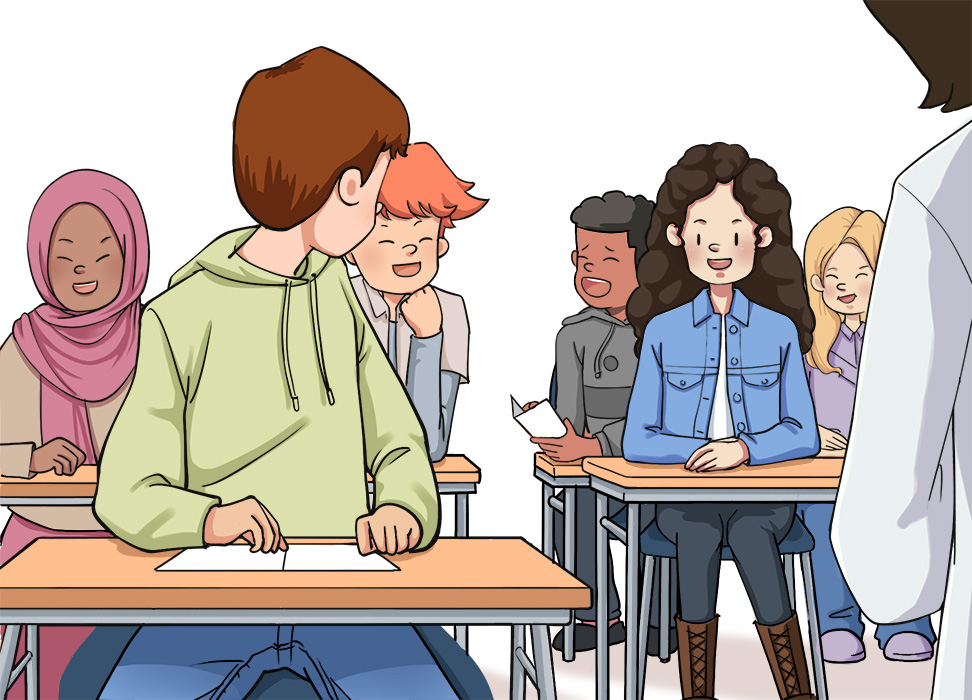
The words you choose matter, along with actions and beliefs
Have you ever had a bad day or week, and instead of saying, “I feel sad,” you say, “I am depressed”? These two words may seem like they have the same meaning, but they don’t really. With the first word, you’re talking about an emotion, while the other describes a mental health condition.
Learning what different words mean and thinking carefully about the language you use to say how you feel is really important. By using the right words, you can help get rid of misunderstandings and harmful beliefs about mental health (known as stigma).
Let’s look at some examples of stigmatizing words, actions and beliefs
(Click/tap on the tiles for examples)

Words
Words
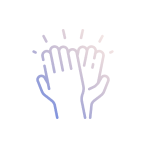
Actions and behaviours
Actions and behaviours

Beliefs
Beliefs
Let’s use the mental health pyramid to describe what you may be feeling
Each tile describes how you might feel because of something that has happened in your life.
Which mental state would you be experiencing in each of these examples?
(Click/tap on the tiles to show the answers)
Feeling sad because you got a bad mark on a test
Mental distress
Feeling nervous because you’re starting at a new school
Mental distress
Feeling worried because your parent lost their job
Mental health challenge
Grieving because of the death of a friend
Mental health challenge
Feeling upset because you are being bullied at school
Mental health challenge
Feeling depressed to the point you stop going to school
Mental health condition
Feeling so worried that you start having panic attacks every couple of days
Mental health condition
Keep learning and adding to your language toolbox!
